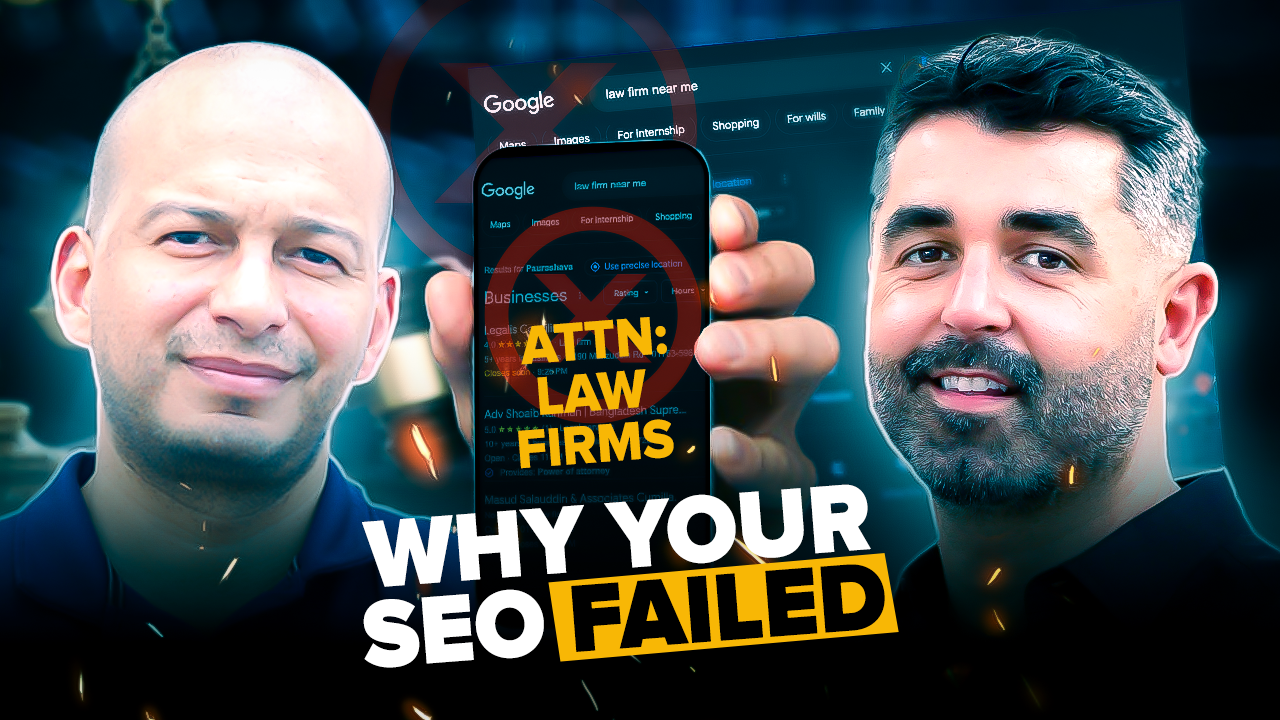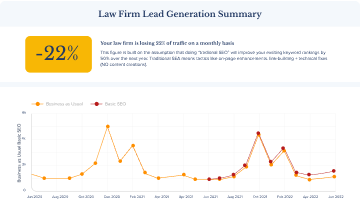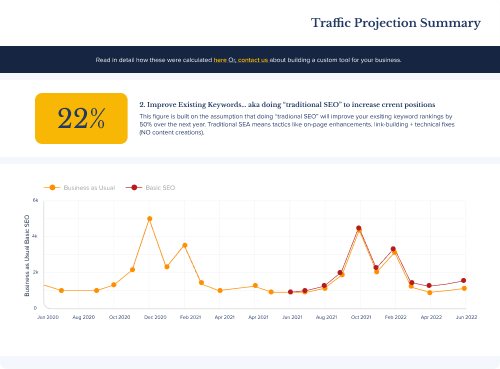
4 Reasons Your Law Firm’s SEO Is NOT Working
Wondering why your law firm’s search engine optimization efforts haven’t yielded the new clients and cases you expected? You’re not alone.
We hear this often from the numerous attorneys we speak with each week. The truth is, most law firms struggle with SEO for some very common reasons.
But there’s good news – the issues preventing your SEO success can be easily identified and remedied when you know what to look for. In this comprehensive guide, we’ll cover the four most frequent SEO mistakes law firms make so you can get your search marketing back on track.
Here’s what we’ll be exploring:
- Why failing to set proper expectations upfront dooms many SEO campaigns
- How to better understand and progress through the SEO process
- Building authority and trust signals to compete with dominant firms
- Aligning your strategy with Google’s current search results layout
- Spotting and avoiding “snake oil” SEO agencies
By the end, you’ll have actionable insights into creating an effective, conversion-driven SEO strategy tailored specifically for law firms.
Let’s get started!
Check out our videos for deeper insights, or tune in to our Podcast for legal marketing insights on the go.
Reason #1: You Didn’t Manage Your Expectations
One major reason your previous SEO efforts haven’t panned out is that expectations weren’t properly managed from the start.
When beginning search engine optimization for your firm, it’s crucial to establish realistic timelines and goals based on competitive conditions in your market along with your current digital presence.
Factors like market competition, website history, content volume, and more impact how quickly you can expect to see SEO results. Failing to account for these when setting objectives often leads to premature frustration that the SEO “didn’t work”.
But in many cases, the process is right on track – it may just require more patience or persistence than originally anticipated.
Understanding Your Competitive Landscape
If you’re located in an extremely competitive legal market like Miami with prominent firms like Morgan & Morgan dominating related searches, you likely face an uphill battle ranking on relevant terms right away regardless of your SEO agency.
Recognize that firms who have invested heavily in search visibility for years or decades won’t be easy to displace without a strategic, long-term effort.
If your firm is new or you haven’t focused extensively on search marketing until now, be realistic that you may not overtake these market leaders quickly – if ever.
Tempering expectations here is wise so you don’t end your SEO campaign prematurely over frustration it “didn’t work fast enough”. Steady, incremental growth should be the initial goal.
Grasping the Full SEO Process
Beyond competition, struggling with impatience over SEO outcomes also indicates a lack of understanding around the underlying search marketing process itself.
Many lawyers aren’t fully aware of the extended timeframe and compounding factors that influence search visibility.
But SEO isn’t magic – it occurs in clearly defined, sequential steps:
- Indexation – Getting your website pages added to Google’s search index to even be discoverable/eligible to rank
- Ranking – Optimizing pages to improve positions for target keywords
- Traffic – Drawing more qualified organic visitors from better rankings
- Conversions – Transforming that traffic into leads/calls/clients
Progressing through each phase can take significant time depending on where you’re starting from and how competitive your niche is.
The key is identifying which step your SEO efforts currently fall under and setting expectations appropriately. Otherwise you risk quitting right before a breakthrough happens!
Now that we’ve covered why setting proper expectations is essential for SEO success, let’s look at the next big reason law firms struggle with search visibility…
Reason #2: You Don’t Have Enough Authority or Trust
Another major factor impacting your SEO progress is the relative authority and trust signals your website/firm currently has in Google’s eyes.
When it comes to competitive legal search terms, you often compete with well-established personal injury, DUI defense, or family law firms with significantly higher authority metrics.
How does Google measure authority and trust for law firms though?
There are a few core components…
Backlinks from Reputable Sites
Google views backlinks, aka citations or links from external sites back to yours, as one of the strongest endorsements that you offer valuable, credible information.
The more backlinks a website has, especially from authoritative niche sites, the higher authority it carries in rankings.
If your law firm website is newer or hasn’t prioritized link building, trying to outrank established sites with tens of thousands more trust indicators will be extremely difficult.
Reviews on Key Directories
The number, consistency and positivity of your reviews across key legal directories such as Google My Business, Avvo, and Yelp also signal authority on localized search terms.

Firms boasting hundreds or thousands of positive customer reviews will likely outperform those with little or no review volume in local pack/map rankings.
(Positive reviews also foster trust and credibility with potential clients!)
Trust Through Thought Leadership
Lastly, Google interprets trust through “functional authority” built over years cultivating true niche expertise via conferences, author credits in trade journals, firm-branded content hubs, podcast interviews and media placements.
Essentially, the more your firm visibly contributes knowledge rather than just promotions to your practice area over time, the greater trust you build.
While trust metrics carry the most weight on hyper-competitive keywords, optimizing them simultaneously helps rank for mid- to long-tail terms more quickly.
Now let’s move on to the strategy issue hampering many law firms’ SEO…
Reason #3: You’re Following an Outdated Strategy
As damaging as expectations mismanagement and insufficient trust factors may be, another central issue handicapping law firm SEO is relying on a dated search strategy no longer aligned with Google’s results priorities.
If your agency crafted your SEO approach years ago without evolution, it likely fails to reflect Google’s increased favoring of local service ads (LSAs), map packs and paid ads over traditional organic blue links.
Let’s dissect a key search like “Miami personal injury attorneys” to demonstrate how effective positioning has changed:
Local Service & Paid Ads Dominate Top Results
At the very top, you’ll now see LSAs featuring law firm bios, photos, ratings and calls-to-action occupying premium space alongside standard text ads.

Google generates major profits from ads, so claiming position zero through paid search remains important even as organic visibility increases over time. Prioritizing LSAs also makes sense based on searcher intent and behavior.
Local Map Pack Grabs Attention Next

Scrolling down brings you to the map/local pack section aggregating and displaying key information on firms matching the localized intent.
Given the inherent interest and convenience of scanning relevant firms and locations here WITHOUT needing to click-through to sites, gaining prominent placement is this critical section is hugely impactful.
Organic Listings Pushed Down
Finally, on page one ONLY THREE of the now six organic listings on a competitive keyword actually take users directly to law firm websites for conversions.
The remaining visibility comes from supplemental legal profiles/directories less equipped to drive calls. So there is MUCH greater competition here even if you rank on page one organically.

Additionally, scrolling fatigue means fewer searchers even reach these organic listings at the very bottom anyways compared to ads and map packs above the fold.
In summary – the SEO strategy many firms and agencies still cling to of pure organic rankings focused on website visibility is increasingly outdated and ineffective based on actual high-value placement opportunities.
Let’s move on to the final reason your law firm SEO might be failing: choosing the wrong agency…
Reason #4: You Hired the Wrong SEO Agency
Given the complex, ever-changing nature of search algorithms and results, it’s understandable most law firms seek out specialists support for SEO rather than going it alone.
Unfortunately, the popularity of search marketing and lack of barriers to entry in the space leads many lawyers down the wrong path with an unqualified agency.
Symptoms of putting your faith into a low-quality SEO provider include:
Outsourcing Content Creation and Link Building
High-performing content that moves rankings and effective link building outreach cannot be mass produced offshore. Lawyers need onshore specialists familiar with their niche using individualized strategies.
Cookie-Cutter Campaigns
Each law firm has a unique competitive situation requiring tailored optimization solutions – any agency pushing one-size-fits-all packages likely won’t deliver long-term success.
Overpromising Fast Results
Ethical SEO agencies understand achieving prominent visibility depends greatly on preexisting website factors and competition levels described earlier rather than just effort invested. They forecast reasonable timeframes aligned with your circumstances.
Lack of Legal Specialization
Generalist agencies may be able to handle technical aspects like site crawling and indexing, but likely aren’t equipped to create truly effective legal content/link profiles that shift rankings within this unique niche.
While the digital marketing space does still contain its fair share of snakes oil salespeople overpromising a quick fix, plenty of qualified SEO specialists do exist. The key is asking the right questions during your search.
The Key Takeaway
We know firsthand how frustrating investing months of time, money and hope into improving your law firm’s digital presence can be when the expected new cases and revenue don’t emerge.
But while an immediate rankings boost or front-page placement overnight remains unlikely focusing on traditional organic SEO alone, that doesn’t mean achieving search marketing success is impossible.
It simply requires resetting expectations based on your firm’s specific situation, executing a process-driven strategy optimized for Google’s current results layout, and finding the right marketing partner committed to long-term, sustainable growth.
At WEBRIS, our sole focus is helping US-based law practices build visibility, trust and conversions across all critical search placements – not just in the now diminished traditional organic listings.
We formulate data-driven paid, organic and social campaigns specific to each firm while remaining flexible to shifts in Google’s algorithm. If you’re ready to get your SEO back on track the right way, set up a free strategy session with our team.

Your Website Is Losing Money!
Find out how many leads your website SHOULD be getting through our Traffic Projection Analysis.
FIND OUT MOREIs Your Website Costing You Clients?

Is Your Website Costing You Clients?
Find out how many new cases your website SHOULD be getting through our Traffic Projection Analysis.
A data driven analysis that accurately forecasts how much traffic (and cases) your website should be getting from Google each month.
BOOK MY ANALYSIS